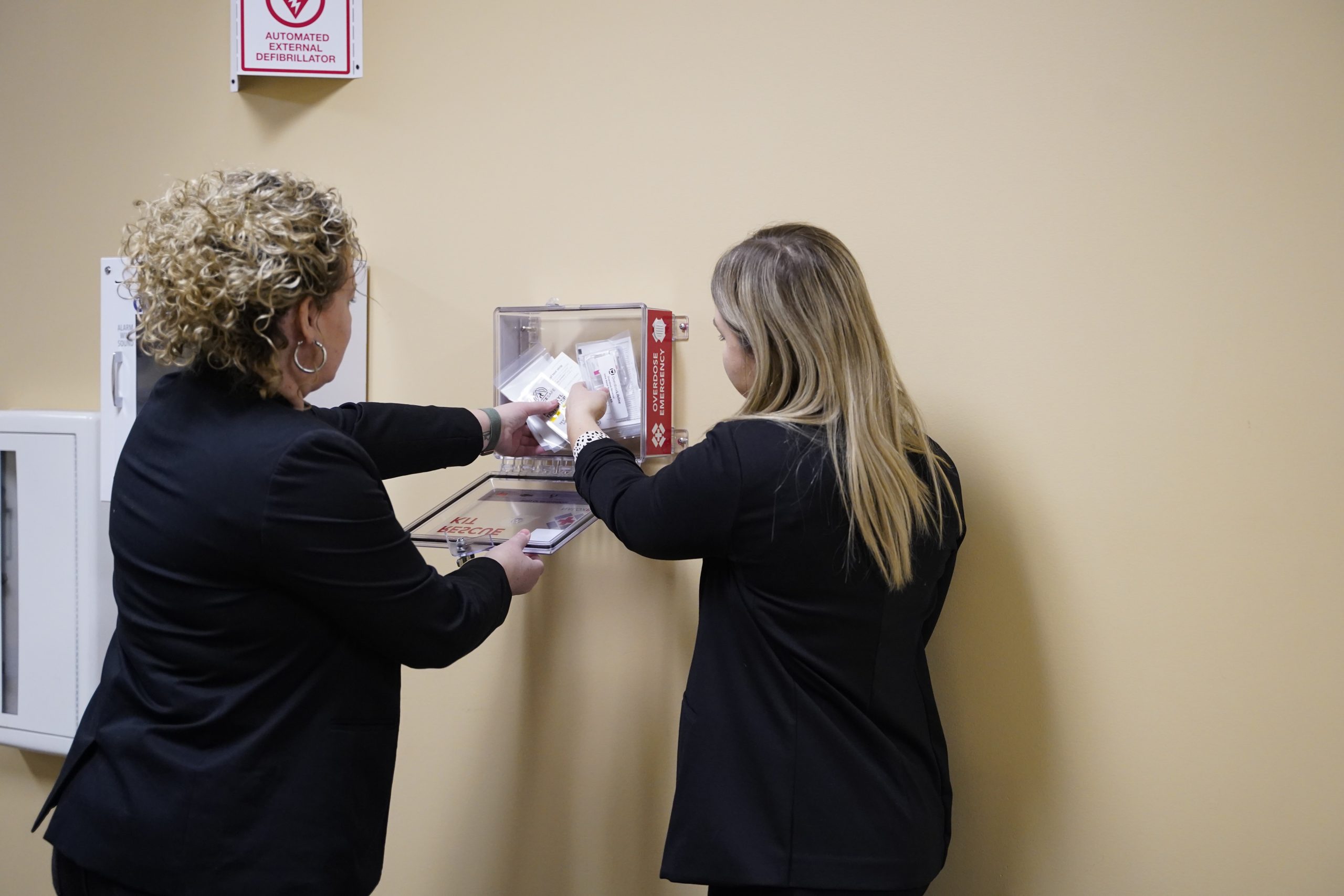Social Work Masters Cohort Leads Effort to Bring NaloxBoxes to Campus as a Safety Initiative to Serve Community & Reduce Stigma of Opioid Abuse

The University of Indianapolis campus has a new safety element–an initiative that everyone hopes is never needed, but one that mirrors a growing trend nationwide on college campuses. Five NaloxBoxes, stocked with supplies designed to prevent and reverse an opioid overdose, will provide easy access to life-saving tools to the UIndy community as well as the surrounding University Heights neighborhood.
The installation of NaloxBoxes was led by masters students in the Phyllis Lan Lin School of Social Work and Counseling who studied addiction and mental health in Indianapolis. While there have been zero overdoses on campus, students found that overdose incidents and death were on the rise within the city, and that a lack of access to harm reduction resources was a serious barrier to overdose prevention.
The initiative was overseen by Stephanie Rudd, an associate professor of social work at the University of Indianapolis, and is a collaboration with a number of partners including Overdose Lifeline and Indiana’s Division of Mental Health and Addiction (DMHA).
“Having NaloxBoxes containing Narcan and fentanyl testing strips on college campuses is crucial for addressing the country’s opioid crisis and ensuring the safety of students as well as the surrounding community,” said Rudd. “By adding NaloxBoxes, the University of Indianapolis is demonstrating a commitment to the health and well-being of its students. This initiative can and will save lives.”
Each NaloxBox is free to access by any member of the community. No ID or signature is required to open the box.
The boxes are installed in locations that provide the most convenient access to the UIndy community as well as the University Heights neighborhood, as identified by the 2023 cohort:
- Schwitzer Student Center
- Health Pavilion
- Ruth Lilly Fitness Center
- The 24-Hour Study Lab in Krannert Memorial Library
- UIPD Police Station on Shelby St.
Kemau Sullivan, who graduated in May 2023, was one of the seven students in the cohort who led the initiative. He made it a priority to return for the official unveiling and stocking of the NaloxBoxes on Jan. 30.
“That’s what matters,” Sullivan said. “The threat is real. The need is real. It has to be available. By doing that, I believe that one of these days, some of that will be used and it will make a difference. It means everything to me.”
Each NaloxBox is stocked with nasal sprayers of Narcan, a brand name for naloxone that rapidly reverses an opioid overdose, and fentanyl testing strips that can detect the presence of fentanyl in pills or powders.
“Our initiative importantly promotes a proactive approach to harm reduction, acknowledging the realities of substance use on campuses. Additionally, this sends a powerful message that UIndy prioritizes safety and cares about the welfare of its community members,” said Rudd. “The boxes were strategically placed according to student and community traffic. Incorporating these harm reduction measures contributes to destigmatizing substance use and addiction. It fosters an environment where individuals feel comfortable seeking help without fear of judgment or punitive measures. Education and awareness play a crucial role in breaking down stereotypes and misconceptions surrounding substance use; Overdose Lifeline’s website is an incredible resource for this valuable education and awareness. By promoting open dialogue and destigmatizing support, UIndy is creating a more compassionate community that encourages individuals to seek help when needed, ultimately contributing to a safer and healthier campus environment.”
The project is only possible through the partnership of several groups and individuals: Overdose Lifeline, Indiana’s Division of Mental Health and Addiction and the Governor’s office, UIndy police, UIndy’s College of Education and Behavioral Sciences and its dean, John Kuykendall, and associate dean, Rachel Feldwisch, as well as Wanda Watts, the director of the Master of Social Work program in the Phyllis Lan Lin School of Social Work and Counseling.
